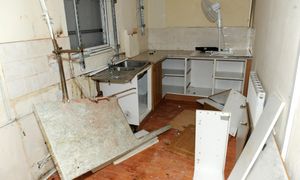Posted by Teresa on January 29, 2011 under Landlord Tips | 
 Landlords are generally responsible by law to provide sufficient heating for tenants—so what happens when the utility company is getting ready to shut off the heat in one of your units? Most leases cover who’s responsible for utilities; some pay their tenants’ landlords utilities, while others require tenants to set up their own accounts with utility providers.
Landlords are generally responsible by law to provide sufficient heating for tenants—so what happens when the utility company is getting ready to shut off the heat in one of your units? Most leases cover who’s responsible for utilities; some pay their tenants’ landlords utilities, while others require tenants to set up their own accounts with utility providers.
Most landlords are concerned for their tenants’ well-being, but of must also think of potential property damage that can be caused when a unit goes without heat in the middle of winter, like freezing and bursting pipes, and water damage.
Here are a few general answers to the question, “What can I do if my tenant’s heat is cut off?”
When in doubt about legal questions, check with your legal advisor. This blog is not intended to be a source of legal advice.
1. Landlords are not responsible for a tenant’s legal or financial obligations. If they are required by the lease to keep heat on in the unit, and they fail to pay the bill until the utility is forced to terminate service, they are responsible.
2. Your tenant is also responsible for subsequent damage to your property as a result of their negligence. While it may seem like adding insult to injury, it’s simply the consequence of the tenant breaking a legal agreement.
3. Prevention is the key. You do not want to find out about a tenant with utility issues from the downstairs tenant, who calls to report water dripping through the ceiling. Make arrangements with the utility company that any service shut-off notifications are sent to you.
4. Take another look at your lease agreement. Be sure that it states that heat is required in the unit to protect pipes, etc. from damage, and that failure to heat the unit is cause for eviction.
Don’t allow a simple lack of preparation to cause unnecessary damage to your rental property. Make sure you know what’s going on with your tenants and set up notifications with the utility companies that service your properties.
Posted by Teresa on January 25, 2011 under Landlord Tips, Tenant Screening & Background Checks | 
 He said it best himself: “Check your tenants out before you let them occupy. That’s the one thing I was guilty of.” A Florida man is out more than $15,000 in damages after thieves, who may or may not have been his tenants, ripped off everything that wasn’t nailed down from his rental house.
He said it best himself: “Check your tenants out before you let them occupy. That’s the one thing I was guilty of.” A Florida man is out more than $15,000 in damages after thieves, who may or may not have been his tenants, ripped off everything that wasn’t nailed down from his rental house.
Actually, they did steal or damage several items that were nailed down, screwed in, glued on and attached to the structure. Here’s a partial list:
- The kitchen sink
- The carpeting
- The phone lines
- The kitchen island
- The kitchen appliances
- The kitchen cabinets
- The toilets
- The hot water heater
- The air conditioning unit
- The countertops
How could this happen? First of all, the house was in Florida and the landlord lived in Washington state. Next, he apparently had not received a rent payment “in months.” It was only then that he attempted to contact the tenants. Unsuccessful at reaching them, he trekked across the country to check on the rental house—only to find it stripped.
The homeowner is new at the landlord business. Purchased as an investment he decided to rent the home after unsuccessful attempts to sell it. Out-of-state owners sometimes make classic landlord errors that might have prevented this loss:
- No local property manager. When you live 3,500 miles from your rental property, it’s very difficult to keep an eye on things. Spending the money for a good property manager can prevent losses such as this one.
- No relationship with neighbors. How many neighbors saw the house being stripped? Surely the thieves had a handy excuse for what they were doing, but had the landlord made one contact, even one neighbor who had agreed to call if they noticed anything unusual, he might have helped prevent this theft.
- No tenant pre-screening. The landlord did not conduct a background check or pre-screening or any kind on the tenants. He had homeowner’s insurance, of course. But he didn’t really know who was renting his home. Tenant screening is simply a must-do when leasing rental property. Just like paying taxes, doing maintenance and buying insurance. Especially when the rental property and the rental property owner are separated by thousands of miles.
Perhaps this major theft could have been avoided. While the landlord doesn’t know for sure that the tenants were involved, he has not been able to reach them for months. Screening them thoroughly would have at least informed the landlord whether they were credit worthy, had a good rental history, and had any criminal history. It’s always better to be safe than stripped!
Posted by Teresa on January 19, 2011 under Landlord Tips | 
 The business of renting property is never perfect. It can be tough. Sometimes, it can be really tough. But today we’re going to focus on what landlords can do to make their properties better places to live. And who knows? These efforts can pay off in happier tenants, longer leases, and higher-quality applicants.
The business of renting property is never perfect. It can be tough. Sometimes, it can be really tough. But today we’re going to focus on what landlords can do to make their properties better places to live. And who knows? These efforts can pay off in happier tenants, longer leases, and higher-quality applicants.
- Your rental property is kid- and pet-friendly. While this doesn’t work for every property, it does make things easier for parents of two-and four-legged kids. Provide and enforce clear-cut rules, along with designated areas for kids to play and dogs to do their business, and you can make nearly everyone happy—even your tenants who prefer to keep rugrats and furballs at arm’s length.
- Your rental property is fun. Creating positive interactions between residents, through potluck dinners, book and movie exchanges, a game room, or picnics can go a long way toward creating a community. People who know their neighbors feel more safe—and are more willing to look out for each other.
- Your rental property is welcoming. While it is the law that you do not discriminate on the basis of race, religion, family status, disability, sex and other factors covered by the Fair Housing Act, you create quite a different feeling when you advertise that everyone is welcome. Print a statement of welcome to all people on your leases, add it to your signage and your advertisements, too.
- You provide excellent customer service. Great landlords remember that their tenants are their customers. Without them, there is no rental business. All landlords know the feeling of less-than-100% vacancy; try to keep it in mind when servicing your tenants.
- You strive to accommodate everyone. Providing closer parking for disabled is the law, but reserving a few close spaces for older tenants, who might not have an actual disability is just a nice thing to do. Providing secure storage for bicycles encourages their use, which is good for the planet and the health of your tenants.
- You treat your tenants with respect in every interaction and communication. Few people cannot tell when they’re being disrespected or on the receiving end of a condescending attitude. If showing respect is difficult for you, then leasing property might not be the best business to be in.
Being a great landlord is not just a nice way to conduct business—it IS good business! Happy tenants will stay longer, cause fewer problems and recommend your property to their friends, family and co-workers. Why not strive to be a great landlord?
Pre-screen all tenants as part of your standard application process. Background and credit checks will help ensure you rent to qualified tenants. For more landlord resources, including forms and information on tenant screening, turn to E-Renter.com.
Posted by Teresa on January 14, 2011 under Landlord Paperwork and Forms, Landlord Tips | 
 If you’re a landlord who is selling your rental property, here are some guidelines for notifying your tenants. Laws and regulations vary according the city and state where you live, so check yours for specifics.
If you’re a landlord who is selling your rental property, here are some guidelines for notifying your tenants. Laws and regulations vary according the city and state where you live, so check yours for specifics.
- Double-check your lease, which may or may not address the sale of the property. Many large apartment building change hands without the tenants knowing, but for single family residences, small buildings and duplexes, it’s more difficult to show and sell a property without tenants knowing something is going on.
- If a tenant asks what’s up, be honest. Reassure them that the new owner will welcome them as tenants. Do what you can to avoid losing any tenants before the sale is final.
- It’s not generally required that you notify tenants that the building is going on the market. However, if you need entry to a unit to show a potential buyer, follow the standard notification period you use before entering a tenant’s unit.
- Remember that happy tenants are a big selling point. Try to avoid numerous interruptions and make an attempt to accommodate the tenant’s schedule.
- Most questions you receive will be regarding security deposits. Let tenants know if you and the buyer decide to:
a. refund all security deposits so new owner can collect them anew;
b. transfer existing security deposits to the new owner.
- When the sale is completed, send a notification to each tenant with the effective date that you will no longer own the building or accept rent payments. Ideally, this would arrive at the same time as a letter from the new owner, directing tenants where and to whom to send rent payments.
- State laws vary, but in general, once the sale is completed, the new owner is obligated to honor all existing leases. Whether they do or not—or whether tenants wish to continue with the lease or not—is no longer your problem.
Posted by Teresa on January 11, 2011 under Landlord Tenant Lawsuits, Tenant Screening & Background Checks | 
 You’re probably familiar with the news story about a house in Escondido, CA, where the resident is accused of making bombs and plotting bank robberies. Because of danger to neighbors, the decision was made to burn the house completely to the ground.
You’re probably familiar with the news story about a house in Escondido, CA, where the resident is accused of making bombs and plotting bank robberies. Because of danger to neighbors, the decision was made to burn the house completely to the ground.
Now the question is, “Who’s responsible for the compensating the property owners?” While the county made the decision to destroy the house in the interest of public safety, where did that leave the owners of the home, who rented it to the accused bomb maker? Should the owners’ insurance company reimburse them for the loss? Or is this a necessary expense of the taxpayers of San Diego County, who are already burdened with the expenses of removing the hazard and the resulting cleanup?
Obviously, the accused man, George Jakubec, bears the full responsibility for his actions. But it’s doubtful he’ll have the ability to repay the homeowner. Some say the landlords should be responsible for their loss and to the county for all expenses because of negligence—that they should have known of this tenant’s activities. Questions have arisen about whether proper tenant pre-screening and periodic inspections were conducted.
However, there is no proof that the landlords didn’t screen the tenant prior to signing a lease. Even if they had, the suspect’s crime record has not been released, so we don’t know whether or not he had a criminal record that would have prevented the landlord from renting the property to him.
Most landlords know that their tenants have the right to peaceful habitation, without harassment or unnecessary inspections. However, landlords who care about their properties schedule periodic maintenance to not only protect the property value, but to ensure that illegal or dangerous activity is not taking place.
In the Escondido case, the landlord’s attorney has filed a claim with San Diego County, asserting that no legal justification existed to burn the house. Further, the claim states the eminent domain procedures that would have compensated the property owners were not followed. We’ll keep watching for updates.
In the meantime, a word to the wise: keep conducting thorough tenant screening and background checks, and schedule periodic inspections of your rental properties. It’s so much better to be safe than sorry!
Posted by Teresa on January 9, 2011 under Landlord Paperwork and Forms, Landlord Tips | 
 Our previous post about a cop-calling tenant raised some additional questions from landlords:
Our previous post about a cop-calling tenant raised some additional questions from landlords:
Marilyn owns a duplex and lives in one unit. She rents the other unit to a tenant who confided in Marilyn that she is afraid that her ex-boyfriend was stalking her. The man was driving past the house several times a day, and the tenant had recently seen his car in the parking lots of the mall and grocery store where she had been shopping. She was worried, and wanted to let Marilyn know about his actions in case he became threatening.
Marilyn wants to protect her tenant and her property, but is rightfully concerned about getting too involved in the tenant’s situation. “I’m planning on calling the police if I ever see him near my property,” she said.
Police might recommend that Marilyn allow her tenant to take care of this problem directly, since the tenant is the legal resident of her unit. An attorney might say that Marilyn must take some sort of action to avoid being held responsible in the event a criminal action takes place against the tenant.
Encouraging a tenant who is being harassed to obtain a restraining order is certainly within a landlord’s area of responsibility. And as soon as Marilyn feels threatened by the ex-boyfriend, she too can seek a restraining order.
It is never a good idea to attempt any confrontation with a violent person. Stalking behavior is not acceptable behavior—it is a warning sign that should not be ignored. While it is understandable that Marilyn wants to protect her tenant and her property, it’s best to follow the law and let the police handle every confrontation with the ex-boyfriend.
Scott’s tenants were robbed soon after they moved into one of his apartment units. The thief took their TV, a computer, some cash and jewelry. The tenants claimed that Scott failed to protect them by providing proper door locks. Scott is curious about the limit of protection a landlord owes his tenants in this situation.
Robberies happen every day, in every level of neighborhood in America. A landlord cannot prevent a criminal who really wants to get in from entering a rental unit. However, solid locks on the entry doors and windows are necessary, and if your rental properties are lacking them, now is a good time to remedy that situation—before a robbery or something worse happens.
To avoid any question of liability, every rental agreement should include a clause requiring tenants to purchase renter’s insurance. Further, it should explain that the landlord’s insurance does not cover theft of the renter’s contents. If a tenant does not carry required insurance, the landlord could move to eviction.
Pre-screen all tenants as part of your standard application process. Background and credit checks will help ensure you rent to qualified tenants. For more landlord resources, including forms and information on tenant screening, turn to E-Renter.com.
Posted by Teresa on January 4, 2011 under Landlord Tips, Tenant Screening & Background Checks | 
 We recently heard from Jason, a fairly new landlord, regarding a common problem: a tenant who calls the police—a lot. “I did my due diligence and ran a tenant background check and criminal screening on her, and she came through with flying colors. Unfortunately, I can’t say the same about some of her former friends,” Jason said.
We recently heard from Jason, a fairly new landlord, regarding a common problem: a tenant who calls the police—a lot. “I did my due diligence and ran a tenant background check and criminal screening on her, and she came through with flying colors. Unfortunately, I can’t say the same about some of her former friends,” Jason said.
After the tenant moved in, her former boyfriend started showing up, uninvited. She felt harassed and seemed to be unable to get him to leave on her own. “She calls the cops at least once a week,” said Jason. “It looks bad to the neighborhood and it concerns my other tenants. I’m thinking about evicting her.”
Jason was rightly concerned that he could be in violation of the law if he proceeded with eviction. He planned to contact his attorney to be sure. But what should a landlord do when an otherwise perfect tenant makes his or her personal problems a larger issue? If the tenant has done nothing wrong, is it fair to force her out?
One landlord said the best course is to encourage the tenant to seek a restraining order, or to refer the tenant to a domestic violence prevention center. Another mentioned that if the tenant is not an innocent victim, but rather calls the police for minor issues that the landlord or property manager should be handling, it could be more of a nuisance issue. In this case, eviction could be the proper recourse to allow other tenants quiet enjoyment of their homes.
Landlords cannot generally evict tenants when they are exercising their rights. And, it is certainly up to the management to control tenant actions when they affect others. Most landlords we talked to about Jason’s case indicated they would get involved in the situation in order to prevent a possible escalation of harassment. Obviously, confronting the ex-boyfriend is not a good idea, but helping the tenant seek a restraining order is much better than doing nothing. Evicting her would only compound the problem.
When you are a rental property owner, it is in your best interest and that of your tenants to provide a safe environment. This tenant’s calls to the police could be a wake-up call for the landlord to get involved. Remember, when it comes to bullies like this tenant’s ex-boyfriend, stay safe and let the police do their jobs!
 Landlords are generally responsible by law to provide sufficient heating for tenants—so what happens when the utility company is getting ready to shut off the heat in one of your units? Most leases cover who’s responsible for utilities; some pay their tenants’ landlords utilities, while others require tenants to set up their own accounts with utility providers.
Landlords are generally responsible by law to provide sufficient heating for tenants—so what happens when the utility company is getting ready to shut off the heat in one of your units? Most leases cover who’s responsible for utilities; some pay their tenants’ landlords utilities, while others require tenants to set up their own accounts with utility providers.





